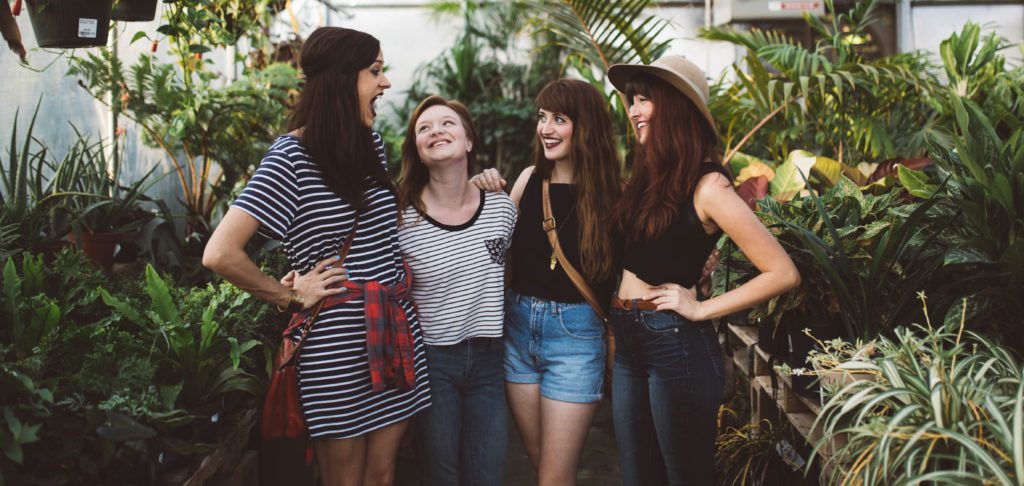At happy hour with colleagues last summer, I confessed to having a crush on someone in my office. It was the type of life-destroying crush that made me feel like a teenager all over again. Well, except for the copious amounts of wine I was drinking to cope.
It was also irresistible gossip. Because I’m The Actual Worst, rather than naming who it was, I asked my friends to guess while I stuffed my face with chicken sliders in a panic. Admitting to crushes makes me squirm.
But then something magical happened. Not only were my coworkers cool enough to play along and start guessing, these friends, who I had known for just a couple years, immediately started guessing the names of both men and women. To be fair, in my office, they ran out of male names pretty quickly, but they didn’t miss a beat. Though the only dating history I’d ever shared was exclusively with men, they didn’t assume I was straight.
That was significant for me, because all my other women friends would and have assumed.
For instance, in a more recent conversation with another friend, I mentioned that “a spouse” is one of the things I hope to have in my lifetime, in addition to a well-stamped passport. Not a husband; not necessarily. A spouse. But she didn’t hear me. I said that I never meet anyone—no gender signifier. She agreed it’s hard to meet men. But I’m not singling her out. Her reactions aren’t unique in the slightest. In fact, they’re what I’ve come to expect.
Of course, that doesn’t mean they’re not disappointing. Why can’t every conversation about romantic partners be as easy as the one with my friends at happy hour?
That evening with my colleagues, when one friend finally guessed the correct name of my summer crush and I confirmed it, I was also confirming that yes, I was in fact attracted to women. That’s not lost on me. I was honest about the fact that it was the first time I’d had a crush on a woman that felt significant. It was the first time I’d had a crush on a woman where I didn’t have to wonder if it was “real” or not. Because it was as real as getting hit by a fucking freight train.
Damn her fuchsia lipstick.
I was questioning for a long, long time, and I’ll admit that during that time, if you’d asked me, I would have said I identified as straight. But in my mind, that looked like “straight?” with a question mark. It’s such a limiting word. Back then, the idea of falling in love with a woman didn’t seem impossible to me, but I had trouble getting any farther than that vague hypothetical, so I figured I must be straight. Even if I were 98% straight, hypothetically, I should just round up and get on with my life, or so I read in a popular advice column.
Many times, I felt like I would just will myself into bisexuality if I could. But anytime I checked in with myself, looking deep inside and asking that question—“is that the right word? Bisexual?”— the answer was still unclear. Most of the time, it was “I’m not sure” and other times, it was “maybe.” So I continued on as “straight-questioning,” but the word “straight” began to feel less and less like an accurate descriptor of myself. Even before I allowed myself to identify as bi, there came a time when saying “I’m straight” would have felt as insincere as getting a spray tan. For a while, I thought of myself as “fluid” and had embarrassing thoughts such as, “I’m not a lesbian, but I’m a huge fan.” (The term “biromantic” did come across my radar eventually, and while it intrigued me, it’s difficult for me to separate romantic and sexual attraction, personally—but that’s a topic for another article.)
So, in order to answer the question “why do my friends assume I’m straight,” perhaps I first need to answer the same question about myself. Why did it take me so long to acknowledge and accept my own bisexuality?
In my hetero-presuming lady friend groups, there’s the time-honored tradition of discussing “girl crushes,” of course. It’s harmless on the surface, and even fun, sometimes. But hearing one of my friends proclaiming that even though she was straight, given the opportunity, she’d “literally have sex with Scarlett Johansson” just left me confused. If straight women had crushes on women, too, wasn’t it possible that I was having the same experiences they were, but I was just the one overthinking everything?
This comic by Hazel Newlevant caught my eye recently when a friend shared it on Facebook. In it, the main character bristles at the notion that, had she lived in a different time, she might never have embraced or even realized her own bisexuality. I admire this writer, but I’m honestly the opposite. I have no trouble believing that if I’d lived in an age where queerness were much more taboo than it is now, I would have locked those feelings away and thrown away the key, never mentioning them to anyone and convincing myself they didn’t matter. I’ve never been a brave person.
A dear online friend became my one outlet to vent these thoughts and frustration. Somewhat hypocritical of my entire thesis here is that even though she’d invited me to co-run a femslash tumblr with her, it still surprised me when she told me she was bisexual. (See, I’m also guilty of assuming!) I was excited that she told me, though, and it opened a dialogue about sexuality and attraction between us that was like nothing I’ve experienced with anyone else. I had always craved a close friendship with a(nother) queer woman, and this was partially why. Finally, finally, I had someone to really speak openly and honestly with about the big, annoying question marks in my mind. Finally, someone understood and reassured me.
She gave me some remarkable advice regarding queerness: “If you think you might be, you probably are.” Why had I never heard it put so simply before? We spoke of the differences between our attraction to men and women and found we could relate in powerful ways. Other bisexual friends have echoed this since then; being attracted to your own gender feels different from opposite-sex attraction for many of us. In retrospect, I realize that one of the reasons it took me so long to recognize my attraction to women as attraction was because there were so many times I mistook it for the feeling of inadequacy. Or, rather, I let it be dwarfed by that feeling. A woman who took my breath away made me feel instantly inadequate and unattractive, thanks largely to growing up in a society that treats female physical attractiveness as an automatic competition regardless of circumstances. On top of that, I’ve always been an easily intimidated person, so any potential attraction to women was buried under layers of toxic bullshit that I had yet to clean up. When I interact with men, there’s always been a reflexive acknowledgement of their “hot” factor: it’s either a yes or a no. I don’t have to think about it and I don’t have a choice; it’s just there. With women, it seemed to take so much intentional reflection that I figured if I were bisexual, I must be the worst bisexual in the world.
And hey, since it took a crush for me to figure things out, maybe I am.
It’s amazing how clear everything became with one significant crush. The first time I saw her face, I knew. There was no thought, no choice. I felt like someone had planted her there, specifically to ruin my life (in a good way). I wanted to get to know her, to hold her, to fall in love with her, to be intimate with her. I couldn’t question anymore, I told myself—I refuse to question anymore. To do so would be inauthentic. True, I may find fluidity in my identity again sometime in the future, but for now, I can say I’m bisexual with an exclamation point instead of a question mark, and that feels good. I finally gave myself permission to “notice” my attraction to women without second-guessing it. I feel like I know myself better now. I like myself better, too. I’ve found a piece of my truth that was concealed for a long-ass time, and it’s wonderful to fill a gap in my identity.
I think that’s why it stings more, now, when I see old friends and they assume. I can’t blame them, of course, but I can wish for more. I wish it could be no big deal. I wish I could say “I’m open to dating, but I never meet anyone” and they would respond with “What type of people are you interested in?”
A few of you might be reading this and saying, “Just come out to them! Stop acting so entitled! Queer people have had to come out for decades and you’re bitching about coming out as bi?” and I hear you. And I KNOW, dear reader, I know. I’m not claiming this is a great and undue hardship placed squarely on my shoulders, or that my friends are all homophobes, or that people should feel sorry for me. At all. I know that queer people in the past had a much harder time and faced much harder circumstances than I EVER will—and, for that matter, many still do. I’m not glossing over that. I can’t begin to comprehend their struggles, and I admire and thank them.
Of course, the solution to this issue is to get over my avoidance of all uncomfortable subjects and just fucking tell people. I’m still an infant in bisexual years, so please be patient with me. All I’m asking is why these assumptions are still so common—why does it still have to be this way, particularly for this generation, when we’ve come of age during time of great progress (albeit with much resistance) in LGBTQA rights. I don’t accept that straight will always be default and that queer individuals will always have to proactively label ourselves in order to be honest.
To that end, I ask everyone to please stop assuming, or at least pay attention to how and when you do. Because your friends with opposite-sex partners and hetero dating histories are not all straight. I promise.
Featured image photo credit: Brooke Cagle

